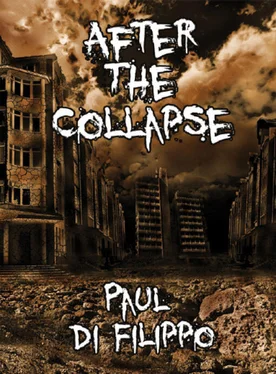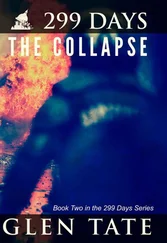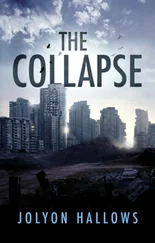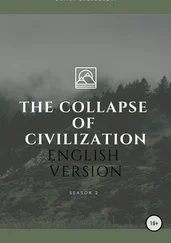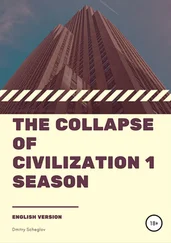The peeling off of the face of the island was a smaller magnitude event than had been feared; but it was a larger magnitude event than anyone was prepared for.
The resulting tsunami raced across the Atlantic.
My city had gotten just twelve hours warning. The surreal chaos of the partial evacuation was like living through the most vivid nightmare or disaster film imaginable. Still, the efforts of the authorities and volunteers and good Samaritans ensured that hundreds of thousands of people escaped with their lives.
Leaving other hundreds of thousands to face the wave.
Their only recourse was to find the tallest, strongest buildings and huddle.
I was on the seventh floor of an insurance company when the wave arrived. Posters in the reception area informed me that I was in good hands. I had a view of the harbor, half a mile away.
The tsunami looked like a liquid mountain mounted on a rocket sled.
When the wave hit, the building shuddered and bellowed like a steer in an abattoir euthanized with a nail-gun. Every window popped out of its frame, and spray lashed even my level.
But the real fight for survival had not yet begun.
The next several days were a sleepless blur of crawling from the wreckage and helping others do likewise.
But not everyone was on the same side. Looters arose like some old biological paradigm of spontaneous generation from the muck.
Their presence demanded mine on the front lines.
I was a cop.
I had arrested several bad guys without any need for excessive force. But then came a shootout at a jewelry store where the display cases were incongruously draped with drying kelp. I ended up taking the perps down okay. But the firefight left my weary brain and trembling gut hypersensitive to any threat.
Some indeterminate time afterwards—marked by a succession of candy-bar meals, digging under the floodlights powered by chuffing generators, and endless slogging through slimed streets—I was working my way through the upper floors of an apartment complex, looking for survivors. I shut off my flashlight when I saw a glow around a corner. Someone stepped between me and the light source, casting the shadow of a man with a gun. I yelled, “Police! Drop it!”, then crouched and dashed toward the gunman. The figure stepped forward, still holding the weapon, and I fired.
The boy was twelve, his weapon a water pistol.
His mother trailed him by a few feet—not far enough to escape getting splattered with her son’s blood.
Later I learned neither of them spoke a word of English.
One minute I was cradling the boy, and the next I was lying on a cot in a field hospital. Three days had gotten lost somewhere. Three days in which the whole world had learned of my mistake.
They let me get up the next day, ostensibly healthy and sane enough, even though my pistol hand, my left, still exhibited a bad tremor. I tried to report to the police command, but found that I had earned a temporary medical discharge. Any legal fallout from my actions awaited an end to the crisis.
I tried being a civilian volunteer for another day or two amidst the ruins, but my heart wasn’t in it. So I took the offer of evacuation to Femaville 29.
* * * *
The first week after the disaster actually manifested aspects of an odd, enforced vacation. Or rather, the atmosphere often felt more like an open-ended New Year’s Eve, the portal to some as-yet undefined millennium where all our good resolutions would come to pass. Once we victims emerged from the shock of losing everything we owned, including our shared identity as citizens of a large East Coast city, my fellow refugees and I began to exhibit a near-manic optimism in the face of the massive slate-cleaning.
The uplift was not to last. But while it prevailed, it was as if some secret imperative in the depths of our souls—a wish to be unburdened of all our draggy pasts—had been fulfilled by cosmic fiat, without our having to lift a finger.
We had been given a chance to start all over, remake our lives afresh, and we were, for the most part, eager to grasp the offered personal remodeling.
Everyone in the swiftly erected encampment of a thousand men, women and children was healthy. The truly injured had all been airlifted to hospitals around the state and nation. Families had been reunited, even down to pets. The tents we were inhabiting were spacious, weather-tight and wired for electricity and entertainment. Meals were plentiful, albeit uninspired, served promptly in three shifts, thrice daily, in a large communal pavilion.
True, the lavatories and showers were also communal, and the lack of privacy grated a bit right from the start. Trudging through the chilly dark in the middle of the night to take a leak held limited appeal, even when you pretended you were camping. And winter, with its more challenging conditions, loomed only a few months away. Moreover, enforced idleness chafed those of us who were used to steady work. Lack of proper schooling for the scores of kids in the camp worried many parents.
But taken all in all, the atmosphere at the camp—christened with no more imaginative bureaucratic name than Femaville Number 29—was suffused with potential that first week.
My own interview with the FEMA intake authorities in the first days of the relocation was typical.
The late September sunlight warmed the interview tent so much that the canvas sides had been rolled up to admit fresh air scented with faint, not unpleasant maritime odors of decay. Even though Femaville 29 was located far inland—or what used to be far inland before the tsunami—the wrack left behind by the disaster lay not many miles away.
For a moment, I pictured exotic fish swimming through the streets and subways of my old city, weaving their paths among cars, couches and corpses. The imagery unsettled me, and I tried to focus on the more hopeful present.
The long tent hosted ranks of paired folding chairs, each chair facing its mate. The FEMA workers, armed with laptop computers, occupied one seat of each pair, while an interviewee sat in the other. The subdued mass interrogation and the clicking of keys raised a surprisingly dense net of sound that overlaid the noises from outside the tent: children roistering, adults gossiping, birds chattering. Outside the tent, multiple lines of refugees stretched away, awaiting their turns.
The official seated across from me was a pretty young African-American woman whose name-badge proclaimed her HANNAH LAWES. Unfortunately, she reminded me of my ex-wife, Calley, hard in the same places Calley was hard. I tried to suppress an immediate dislike of her. As soon as I sat down, Hannah Lawes expressed rote sympathy for my plight, a commiseration worn featureless by its hundredth repetition. Then she got down to business.
“Name?”
“Parrish Hedges.”
“Any relatives in the disaster zone?”
“No, ma’am.”
“What was your job back in the city?”
I felt my face heat up. But I had no choice, except to answer truthfully.
“I was a police officer, ma’am.”
That answer gave Hannah Lawes pause. Finally, she asked in an accusatory fashion, “Shouldn’t you still be on duty then? Helping with security in the ruins?”
My left hand started to quiver a bit, but I suppressed it so that I didn’t think she noticed.
“Medical exemption, ma’am.”
Hannah Lawes frowned slightly and said, “I hope you don’t mind if I take a moment to confirm that, Mr. Hedges.”
Her slim, manicured fingers danced over her keyboard, dragging my data down the airwaves. I studied the plywood floor of the tent while she read my file.
When I looked up, her face had gone disdainful.
“This explains much, Mr. Hedges.”
“Can we move on, please?”
Читать дальше
